英语辩论赛技巧
英语辩论赛反驳对方
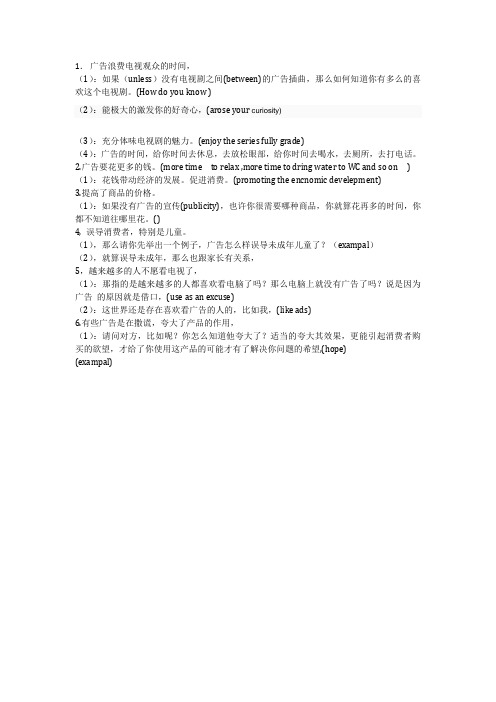
1.广告浪费电视观众的时间,(1):如果(unless)没有电视剧之间(between)的广告插曲,那么如何知道你有多么的喜欢这个电视剧。
(How do you know )(2):能极大的激发你的好奇心,(arose your curiosity)(3):充分体味电视剧的魅力。
(enjoy the series fully grade)(4):广告的时间,给你时间去休息,去放松眼部,给你时间去喝水,去厕所,去打电话。
2.广告要花更多的钱。
(more time to relax ,more time to dring water to WC and so on ) (1):花钱带动经济的发展。
促进消费。
(promoting the encnomic develepment)3.提高了商品的价格。
(1):如果没有广告的宣传(publicity),也许你很需要哪种商品,你就算花再多的时间,你都不知道往哪里花。
()4, 误导消费者,特别是儿童。
(1),那么请你先举出一个例子,广告怎么样误导未成年儿童了?(exampal)(2),就算误导未成年,那么也跟家长有关系,5,越来越多的人不愿看电视了,(1):那指的是越来越多的人都喜欢看电脑了吗?那么电脑上就没有广告了吗?说是因为广告的原因就是借口,(use as an excuse)(2):这世界还是存在喜欢看广告的人的,比如我,(like ads)6.有些广告是在撒谎,夸大了产品的作用,(1):请问对方,比如呢?你怎么知道他夸大了?适当的夸大其效果,更能引起消费者购买的欲望,才给了你使用这产品的可能才有了解决你问题的希望,(hope)(exampal)。
esdp英语演讲与辩论五项
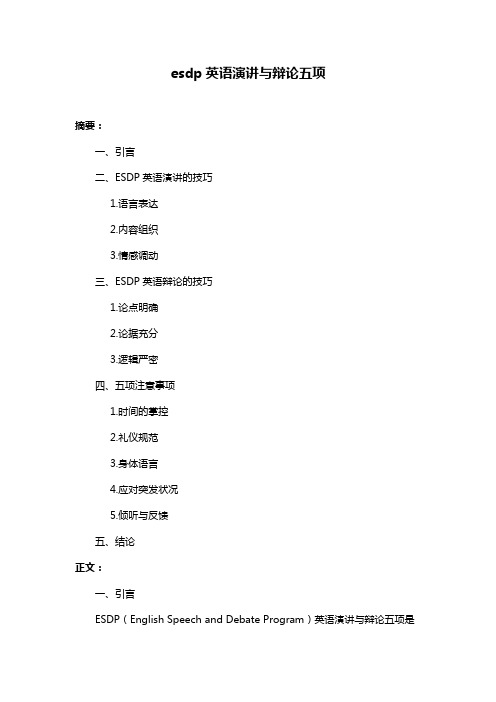
esdp英语演讲与辩论五项摘要:一、引言二、ESDP英语演讲的技巧1.语言表达2.内容组织3.情感调动三、ESDP英语辩论的技巧1.论点明确2.论据充分3.逻辑严密四、五项注意事项1.时间的掌控2.礼仪规范3.身体语言4.应对突发状况5.倾听与反馈五、结论正文:一、引言ESDP(English Speech and Debate Program)英语演讲与辩论五项是一项旨在提高我国学生英语口语表达能力、逻辑思维能力和综合素质的教育活动。
在这个活动中,学生们通过演讲和辩论的形式,锻炼自己的语言组织、思考和应变能力。
为了更好地参与这项活动,以下几点建议将为大家提供帮助。
二、ESDP英语演讲的技巧1.语言表达在英语演讲中,清晰、流畅的语言表达是基础。
为了达到这一目标,同学们需要多加练习,熟练掌握单词发音、语调和语速。
此外,注意运用修辞手法,如比喻、拟人等,使演讲更具感染力。
2.内容组织一个成功的演讲离不开严谨的内容组织。
同学们在准备演讲稿时,要学会分段论述,明确主题,突出重点。
同时,注意合理安排开头和结尾,使整个演讲更具层次感。
3.情感调动情感是演讲的灵魂。
同学们在演讲过程中,要学会运用情感语言,激发听众共鸣。
此外,注意表情、语气和肢体语言的协调,使演讲更具感染力。
三、ESDP英语辩论的技巧1.论点明确在进行英语辩论时,首先要确立明确的论点。
同学们要学会从多个角度审视问题,找到自己支持的观点,并有针对性地展开论述。
2.论据充分辩论中,充分的论据是支持观点的关键。
同学们要善于运用事实、数据、权威观点等论据,有力地支持自己的立场。
3.逻辑严密一个成功的辩论需要严密的逻辑。
同学们在论述过程中,要注意论证的连贯性和合理性,避免逻辑错误。
四、五项注意事项1.时间的掌控在演讲与辩论过程中,注意时间的掌控。
同学们要学会合理分配论述时间,确保重点内容得以充分展现。
2.礼仪规范遵守礼仪规范,尊重对手和评委。
注意着装得体、言辞礼貌,展现良好的精神风貌。
英语辩论赛正方二辩模板

英语辩论赛正方二辩模板一、开场。
大家好呀!咱可是正方二辩呢,感觉超酷有没有?在英语辩论赛里,咱正方二辩可是有着很重要的任务哦。
我一上来呀,就得先针对反方一辩的观点进行反驳。
比如说反方一辩可能会提出一些比较片面的看法,那我就得机智地指出来。
就像上次我们辩一个关于“学生应不应该带手机进校园”的话题,反方一辩说带手机进校园会让学生分心,就只盯着这一个坏处说。
我当时就想,这可不行呀,太片面啦。
我就可以这么说:“Dear opponents, you just focus on the distraction caused by mobile phones, but you ignore the fact that mobile phones can also be a great learning tool. For example, we can use it to look up new words immediately when we are learning English.”(亲爱的对手们,你们只关注到手机造成的分心,但你们忽略了手机也可以是很棒的学习工具这个事实。
例如,我们在学习英语的时候可以用它马上查新单词。
)二、阐述正方观点。
咱正方肯定有自己很坚实的观点的。
我得把正方的观点再深入阐述一下呢。
还是拿学生带手机进校园这个话题来说,如果正方观点是可以带手机进校园。
那我可能会说:“Mobile phones are like a mini - library in our pockets. There are so many useful educational apps on it. We can access to all kinds of e - books, online courses and study materials. It's just like having a world - class library with us all the time. And in case of emergency, we can use the phone to call our parents or teachers quickly. It gives us a sense of security.”(手机就像是我们口袋里的一个迷你图书馆。
英语如何通过参加辩论赛提高口语流利度
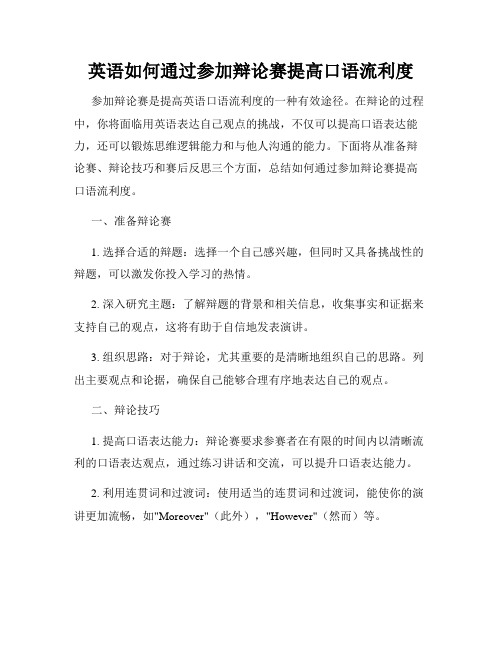
英语如何通过参加辩论赛提高口语流利度参加辩论赛是提高英语口语流利度的一种有效途径。
在辩论的过程中,你将面临用英语表达自己观点的挑战,不仅可以提高口语表达能力,还可以锻炼思维逻辑能力和与他人沟通的能力。
下面将从准备辩论赛、辩论技巧和赛后反思三个方面,总结如何通过参加辩论赛提高口语流利度。
一、准备辩论赛1. 选择合适的辩题:选择一个自己感兴趣,但同时又具备挑战性的辩题,可以激发你投入学习的热情。
2. 深入研究主题:了解辩题的背景和相关信息,收集事实和证据来支持自己的观点,这将有助于自信地发表演讲。
3. 组织思路:对于辩论,尤其重要的是清晰地组织自己的思路。
列出主要观点和论据,确保自己能够合理有序地表达自己的观点。
二、辩论技巧1. 提高口语表达能力:辩论赛要求参赛者在有限的时间内以清晰流利的口语表达观点,通过练习讲话和交流,可以提升口语表达能力。
2. 利用连贯词和过渡词:使用适当的连贯词和过渡词,能使你的演讲更加流畅,如"Moreover"(此外),"However"(然而)等。
3. 学会辩证思考:辩论训练可以帮助你从不同的角度审视问题,锻炼你的辩证思维能力。
通过辩论,你会学会权衡不同的观点,分析问题的利与弊。
三、赛后反思1. 分析自己的表现:战胜自己是提高自己的关键,赛后要对自己的表现进行客观分析和总结,找出自己口语表达方面的不足之处。
2. 听取评委的建议和意见:参加辩论赛时,评委的建议和意见对你的提升非常重要。
仔细聆听评委的评价,接受建议,并尝试将其应用到下一场辩论赛中。
3. 继续学习和练习:参加辩论赛只是提高口语流利度的一个起点,持续的学习和练习是提高口语能力的关键。
定期参加辩论俱乐部或者组织小组辩论,与其他热爱辩论的人进行交流。
总结起来,通过参加辩论赛可以有效提高口语流利度。
准备辩论赛时,选择合适的辩题,深入研究主题,组织思路。
辩论技巧上,提高口语表达能力,运用连贯词和过渡词,学会辩证思考。
辩论英语的技巧
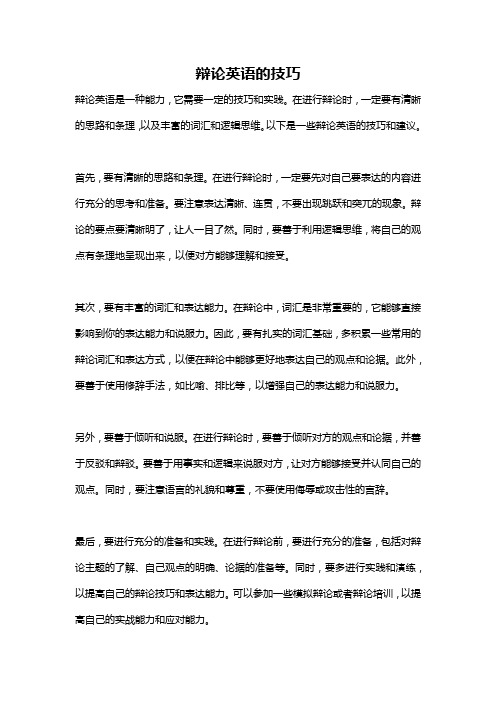
辩论英语的技巧辩论英语是一种能力,它需要一定的技巧和实践。
在进行辩论时,一定要有清晰的思路和条理,以及丰富的词汇和逻辑思维。
以下是一些辩论英语的技巧和建议。
首先,要有清晰的思路和条理。
在进行辩论时,一定要先对自己要表达的内容进行充分的思考和准备。
要注意表达清晰、连贯,不要出现跳跃和突兀的现象。
辩论的要点要清晰明了,让人一目了然。
同时,要善于利用逻辑思维,将自己的观点有条理地呈现出来,以便对方能够理解和接受。
其次,要有丰富的词汇和表达能力。
在辩论中,词汇是非常重要的,它能够直接影响到你的表达能力和说服力。
因此,要有扎实的词汇基础,多积累一些常用的辩论词汇和表达方式,以便在辩论中能够更好地表达自己的观点和论据。
此外,要善于使用修辞手法,如比喻、排比等,以增强自己的表达能力和说服力。
另外,要善于倾听和说服。
在进行辩论时,要善于倾听对方的观点和论据,并善于反驳和辩驳。
要善于用事实和逻辑来说服对方,让对方能够接受并认同自己的观点。
同时,要注意语言的礼貌和尊重,不要使用侮辱或攻击性的言辞。
最后,要进行充分的准备和实践。
在进行辩论前,要进行充分的准备,包括对辩论主题的了解、自己观点的明确、论据的准备等。
同时,要多进行实践和演练,以提高自己的辩论技巧和表达能力。
可以参加一些模拟辩论或者辩论培训,以提高自己的实战能力和应对能力。
总之,辩论英语是一种能力,它需要一定的技巧和实践。
要有清晰的思路和条理,丰富的词汇和表达能力,善于倾听和说服,并进行充分的准备和实践。
只有不断地提高和练习,才能够在辩论中游刃有余,取得好的成绩。
英语辩论赛注意事项
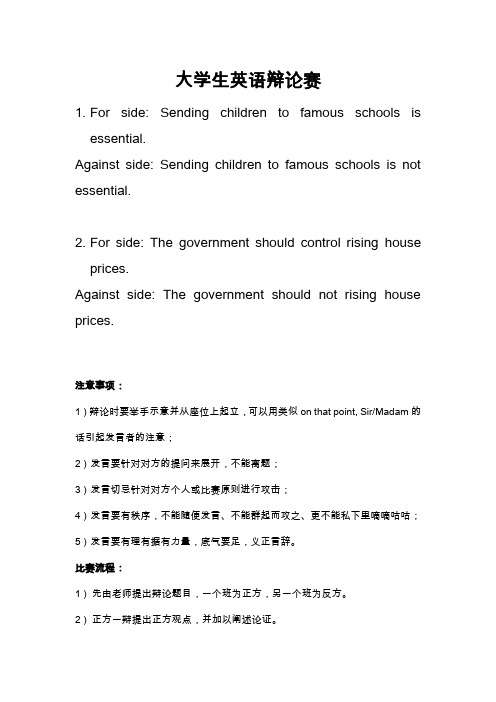
大学生英语辩论赛1.For side: Sending children to famous schools isessential.Against side: Sending children to famous schools is not essential.2.For side: The government should control rising houseprices.Against side: The government should not rising house prices.注意事项:1)辩论时要举手示意并从座位上起立,可以用类似on that point, Sir/Madam的话引起发言者的注意;2)发言要针对对方的提问来展开,不能离题;3)发言切忌针对对方个人或比赛原则进行攻击;4)发言要有秩序,不能随便发言、不能群起而攻之、更不能私下里嘀嘀咕咕;5)发言要有理有据有力量,底气要足,义正言辞。
比赛流程:1)先由老师提出辩论题目,一个班为正方,另一个班为反方。
2)正方一辩提出正方观点,并加以阐述论证。
3)反方一辩提出抗议,并给予有理有据的辩解。
以此类推,正方二辩,反方二辩……4)最后五分钟由双方代表进行总结各自方方的观点和论述。
评分标准1)内容:观点陈述明确,有条理,论点和论据内容是否正确、充实,引用资料和实例是否恰当。
30%2)技巧:语言连贯,反应迅速,辩手语言是否流畅,说理、分析是否透彻,反驳和应变能力是否强,说服力和逻辑性是否强。
20%3)各队在POI环节中的识辩能力、说明能力和逻辑性是否强,接句是否合适,回答是否中肯,反驱是否有力、有理,反应是否机敏,用语是否得体。
20%4)遵守比赛规则,准确把握时间。
10%5)形象气质:仪表,着装整齐辩手的表情、动作是否恰当,是否有风度及幽默感。
10%6)团队合作:全队各辩手的论点是否一致,结构是否完整,队员之间的配合、合作是否默契。
英文辩论技巧

英文辩论技巧英文回答:When it comes to debating in English, there are a few key skills that can really help you succeed. One important skill is the ability to think on your feet and respond quickly to your opponent's arguments. This means being able to listen carefully to what they are saying and then formulate a strong response. For example, in a debate about the environment, if your opponent argues that climate change is not caused by human activity, you could respond by citing scientific evidence that shows otherwise. Being able to think quickly and respond effectively is essential in a debate.Another important skill is the ability to use persuasive language and rhetoric. This means being able to use language in a way that is convincing and compelling. For instance, instead of simply saying "I disagree," you could say "I respectfully disagree, and here's why." Usingpolite and persuasive language can help you win over the audience and make a stronger impression in the debate.Additionally, it's important to be able to anticipate your opponent's arguments and prepare counterarguments in advance. This means doing thorough research and thinking critically about the topic at hand. For example, if you are debating about the benefits of technology in education, you should anticipate that your opponent may argue that technology can be distracting for students. In response, you could prepare examples of how technology has actually enhanced learning in the classroom. Being prepared with strong counterarguments can give you a significant advantage in a debate.Lastly, it's important to be able to stay calm and composed under pressure. Debates can get heated, and it's easy to get flustered or emotional. However, maintaining a calm and composed demeanor can help you appear more confident and in control. For example, if your opponent makes a personal attack against you, it's important not to retaliate with another personal attack. Instead, you couldcalmly redirect the conversation back to the topic at hand.中文回答:在英语辩论中,有几个关键技巧可以帮助你取得成功。
英语辩论赛常用语

英语辩论赛常用语英语辩论赛是一项非常受欢迎的竞赛形式,它可以锻炼学生的辩论能力,提高他们的思维和口才能力。
在一场英语辩论赛中,辩手需要运用丰富的语言表达技巧和严密的逻辑思维,用最少的时间说出最有力的观点。
在本文中,我们将介绍英语辩论赛中常用的一些语言表达技巧和常用语,并给出相关示例,希望能够对参加英语辩论赛的人员有所帮助。
语言表达技巧1.比较级和最高级比较级和最高级是英语表达中常见的用于表示优劣、大小、程度等概念的语法结构。
在辩论赛中,利用比较级和最高级可以更准确地表达观点,增强说服力。
•比较级的使用:比较级一般用于两者之间的比较,可以用来表示优劣。
示例:I believe that bicycles are more environmentally friendly than cars.•最高级的使用:最高级一般用于三者或三者以上的比较,可以用来表示程度、质量等方面的最高水平。
示例:I strongly believe that bicycles are the most environmentally friendly mode of transportation.2.修辞手法修辞手法是英语表达中常见的一种技巧,通过一些字词、句子或段落的修辞手法,可以使语言更加生动有力,增强说服力。
•比喻:通过将一个事物与另外一个事物进行比喻,来帮助听众理解某种观点。
示例:Our government is like a ship sailing through stormy seas.•反问:通过提出一个问题来表达一种观点,可以引起听众的共鸣。
示例:Do we really want our future generations to suffer the consequences of our actions today?•排比:通过将几个类似或相关的事物排列在一起,增强表达的力度。
示例:We need more schools, more teachers, and more resources to improve our education system.3.逻辑结构在辩论赛中,逻辑结构是非常重要的一种表达技巧,一方面可以帮助我们更好地组织表达内容,另一方面可以让观众更加清晰地了解我们的观点。
关于英语辩论赛的技巧
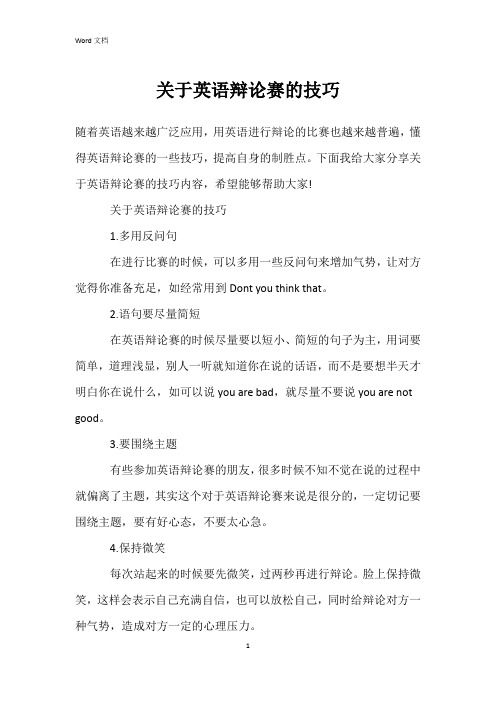
关于英语辩论赛的技巧随着英语越来越广泛应用,用英语进行辩论的比赛也越来越普遍,懂得英语辩论赛的一些技巧,提高自身的制胜点。
下面我给大家分享关于英语辩论赛的技巧内容,希望能够帮助大家!关于英语辩论赛的技巧1.多用反问句在进行比赛的时候,可以多用一些反问句来增加气势,让对方觉得你准备充足,如经常用到Dont you think that。
2.语句要尽量简短在英语辩论赛的时候尽量要以短小、简短的句子为主,用词要简单,道理浅显,别人一听就知道你在说的话语,而不是要想半天才明白你在说什么,如可以说you are bad,就尽量不要说you are not good。
3.要围绕主题有些参加英语辩论赛的朋友,很多时候不知不觉在说的过程中就偏离了主题,其实这个对于英语辩论赛来说是很分的,一定切记要围绕主题,要有好心态,不要太心急。
4.保持微笑每次站起来的时候要先微笑,过两秒再进行辩论。
脸上保持微笑,这样会表示自己充满自信,也可以放松自己,同时给辩论对方一种气势,造成对方一定的心理压力。
5.语速要慢记得你这个是英语辩论赛,全程是用英语进行的,你的对手在你说话快的程度可能会听得到明白你在说话,但大部分听众对于你说得快的情况就会不知道你在说什么,这样就是失去辩论的意义。
辩论战术1.划分战场基本的做法是把一系列关系紧密的问题作为一个战场,并由场上的一名队员提出其中的第一问题,其他队员立即跟上,直到问完这一系列问题,取得了满意战果后,转入下一战场。
这种战术的优点是:火力集中,进攻显得有章法,有层次。
缺点是:有时过于死板,为了贯彻连续提问,对对手临场暴露的弱点只能作简单攻击,而对对手的有力反驳又不能由最恰当的队员来防守,这和自由辩论随机应变的特点是相背离的。
结论:仍然可以适当决定几个战场,但不用强求连续提问,让队员自己控制提问的时机。
2. 两次发言在自由辨论中,一个队员发言后,不要立即把话筒传给其他队员,而在对方发言后,由其自己决定是否作第二次发言。
英语口语中的讨论与辩论技巧
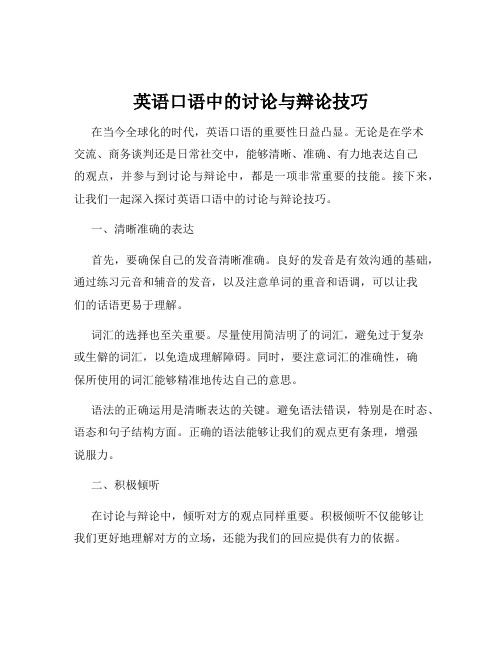
英语口语中的讨论与辩论技巧在当今全球化的时代,英语口语的重要性日益凸显。
无论是在学术交流、商务谈判还是日常社交中,能够清晰、准确、有力地表达自己的观点,并参与到讨论与辩论中,都是一项非常重要的技能。
接下来,让我们一起深入探讨英语口语中的讨论与辩论技巧。
一、清晰准确的表达首先,要确保自己的发音清晰准确。
良好的发音是有效沟通的基础,通过练习元音和辅音的发音,以及注意单词的重音和语调,可以让我们的话语更易于理解。
词汇的选择也至关重要。
尽量使用简洁明了的词汇,避免过于复杂或生僻的词汇,以免造成理解障碍。
同时,要注意词汇的准确性,确保所使用的词汇能够精准地传达自己的意思。
语法的正确运用是清晰表达的关键。
避免语法错误,特别是在时态、语态和句子结构方面。
正确的语法能够让我们的观点更有条理,增强说服力。
二、积极倾听在讨论与辩论中,倾听对方的观点同样重要。
积极倾听不仅能够让我们更好地理解对方的立场,还能为我们的回应提供有力的依据。
集中注意力,专注于对方所说的话,不要分心。
可以通过眼神交流、点头等肢体语言向对方表示自己在认真倾听。
在倾听的过程中,尝试理解对方的核心观点和论据,同时分析其逻辑结构和不足之处。
三、有效提问提问是推动讨论深入的重要手段。
通过恰当的问题,可以澄清对方的观点,挖掘更多的信息,或者引导对方思考。
开放性问题能够鼓励对方展开详细的回答,例如“你为什么会有这样的想法?”“你能具体谈谈这个方案的实施步骤吗?”针对性问题则可以聚焦于特定的观点或细节,比如“你提到的这个数据是从哪里获取的?”四、组织观点在表达自己的观点之前,先在脑海中组织好思路。
可以采用总分总的结构,先提出自己的核心观点,然后列举相关的论据和例子进行支持,最后总结强调自己的观点。
例如,如果讨论的主题是“是否应该限制社交媒体的使用”,可以先表明自己的立场,如“我认为应该限制社交媒体的使用”,接着列举出社交媒体带来的负面影响,如沉迷、信息泄露等,并用具体的案例加以说明,最后再次总结强调限制使用的必要性。
关于英语辩论赛的技巧2017
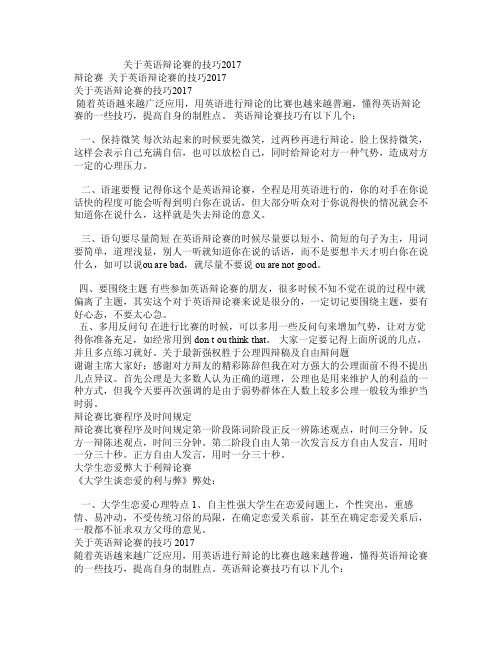
关于英语辩论赛的技巧2017辩论赛关于英语辩论赛的技巧2017关于英语辩论赛的技巧2017随着英语越来越广泛应用,用英语进行辩论的比赛也越来越普遍,懂得英语辩论赛的一些技巧,提高自身的制胜点。
英语辩论赛技巧有以下几个:一、保持微笑每次站起来的时候要先微笑,过两秒再进行辩论。
脸上保持微笑,这样会表示自己充满自信,也可以放松自己,同时给辩论对方一种气势,造成对方一定的心理压力。
二、语速要慢记得你这个是英语辩论赛,全程是用英语进行的,你的对手在你说话快的程度可能会听得到明白你在说话,但大部分听众对于你说得快的情况就会不知道你在说什么,这样就是失去辩论的意义。
三、语句要尽量简短在英语辩论赛的时候尽量要以短小、简短的句子为主,用词要简单,道理浅显,别人一听就知道你在说的话语,而不是要想半天才明白你在说什么,如可以说o u are bad,就尽量不要说ou a re no t goo d。
四、要围绕主题有些参加英语辩论赛的朋友,很多时候不知不觉在说的过程中就偏离了主题,其实这个对于英语辩论赛来说是很分的,一定切记要围绕主题,要有好心态,不要太心急。
五、多用反问句在进行比赛的时候,可以多用一些反问句来增加气势,让对方觉得你准备充足,如经常用到do n t o u thi nk th at。
大家一定要记得上面所说的几点,并且多点练习就好。
关于最新强权胜于公理四辩稿及自由辩问题谢谢主席大家好:感谢对方辩友的精彩陈辞但我在对方强大的公理面前不得不提出几点异议。
首先公理是大多数人认为正确的道理,公理也是用来维护人的利益的一种方式,但我今天要再次强调的是由于弱势群体在人数上较多公理一般较为维护当时弱。
英文辩论赛的技巧与要点
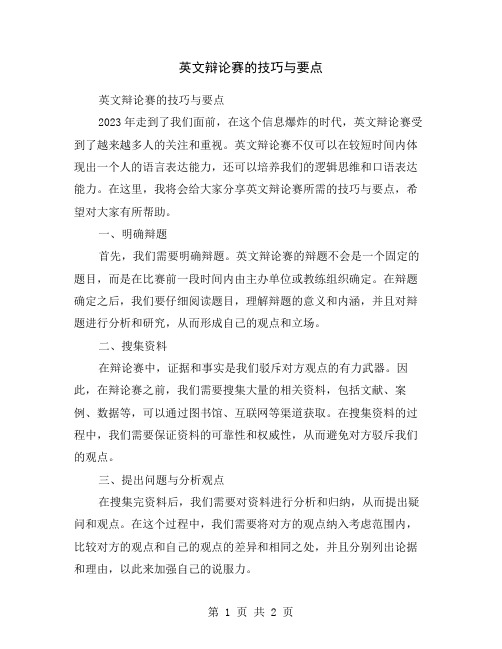
英文辩论赛的技巧与要点英文辩论赛的技巧与要点2023年走到了我们面前,在这个信息爆炸的时代,英文辩论赛受到了越来越多人的关注和重视。
英文辩论赛不仅可以在较短时间内体现出一个人的语言表达能力,还可以培养我们的逻辑思维和口语表达能力。
在这里,我将会给大家分享英文辩论赛所需的技巧与要点,希望对大家有所帮助。
一、明确辩题首先,我们需要明确辩题。
英文辩论赛的辩题不会是一个固定的题目,而是在比赛前一段时间内由主办单位或教练组织确定。
在辩题确定之后,我们要仔细阅读题目,理解辩题的意义和内涵,并且对辩题进行分析和研究,从而形成自己的观点和立场。
二、搜集资料在辩论赛中,证据和事实是我们驳斥对方观点的有力武器。
因此,在辩论赛之前,我们需要搜集大量的相关资料,包括文献、案例、数据等,可以通过图书馆、互联网等渠道获取。
在搜集资料的过程中,我们需要保证资料的可靠性和权威性,从而避免对方驳斥我们的观点。
三、提出问题与分析观点在搜集完资料后,我们需要对资料进行分析和归纳,从而提出疑问和观点。
在这个过程中,我们需要将对方的观点纳入考虑范围内,比较对方的观点和自己的观点的差异和相同之处,并且分别列出论据和理由,以此来加强自己的说服力。
四、口才表达在辩论赛中,口才表达是非常重要的。
一个表达清晰、有力的人会给人留下深刻的印象。
当我们在发言时,我们需要注意以下几点:1.用简单易懂的语言表达观点和立场,不要使用过于复杂的专业术语,让听众能够理解和接受你所说的话。
2.发言时需要注意语言的流畅性和节奏感,不要过于紧张或过于放松,注意语速适中。
3.讲话时需要注意音量和声音的抑扬顿挫,利用音调和语气的变化来强调重点和表达感情。
4.在辩论赛中,我们需要注意举手示意或插话前在脑海中构思好观点和立场,避免因不知所措而浪费时间。
五、团队合作英文辩论赛是一个团队活动,团队协作非常重要。
在团队中,我们需要相互信任,相互尊重,共同前行。
在辩论赛中,我们需要相互配合,分工明确,共同达成目标。
最新整理关于英语辩论赛有什么技巧
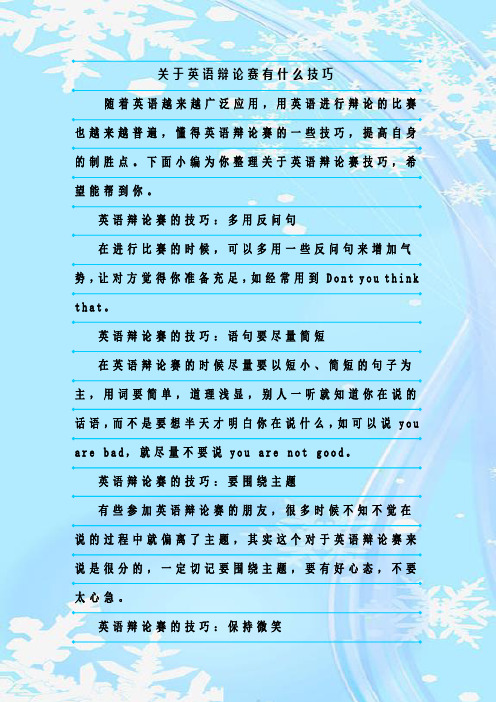
关于英语辩论赛有什么技巧随着英语越来越广泛应用,用英语进行辩论的比赛也越来越普遍,懂得英语辩论赛的一些技巧,提高自身的制胜点。
下面小编为你整理关于英语辩论赛技巧,希望能帮到你。
英语辩论赛的技巧:多用反问句在进行比赛的时候,可以多用一些反问句来增加气势,让对方觉得你准备充足,如经常用到D o n t y o u t h i n k t h a t。
英语辩论赛的技巧:语句要尽量简短在英语辩论赛的时候尽量要以短小、简短的句子为主,用词要简单,道理浅显,别人一听就知道你在说的话语,而不是要想半天才明白你在说什么,如可以说y o u a r e b a d,就尽量不要说y o u a r e n o t g o o d。
英语辩论赛的技巧:要围绕主题有些参加英语辩论赛的朋友,很多时候不知不觉在说的过程中就偏离了主题,其实这个对于英语辩论赛来说是很分的,一定切记要围绕主题,要有好心态,不要太心急。
英语辩论赛的技巧:保持微笑每次站起来的时候要先微笑,过两秒再进行辩论。
脸上保持微笑,这样会表示自己充满自信,也可以放松自己,同时给辩论对方一种气势,造成对方一定的心理压力。
英语辩论赛的技巧:语速要慢记得你这个是英语辩论赛,全程是用英语进行的,你的对手在你说话快的程度可能会听得到明白你在说话,但大部分听众对于你说得快的情况就会不知道你在说什么,这样就是失去辩论的意义。
辩论赛技巧:1、打乱阵脚:组织有序进攻,打乱对方的阵脚,使之兵未败而阵先乱,岂有不败之理?2、直击底线。
有意识地对对方底线全力猛攻,使其自我动摇,无力接济,仅有招架之功,却无还手之力,处于被动境地。
3、时间把握:即从严把握本方时间,有意启导、引导对方在无意识中把规定时间及早耗尽,以造成缺席审判的情势,这对本方极为有利。
4、节奏把握:自由辩论的时间不长,但是由于争锋剧烈,对抗性强,故往往呈现出很强的快节奏。
一般而言,一强到底,一胜到底的队伍不多,这就需要有韧劲和力量持久才能取胜。
【优质文档】辩论赛技巧英文-推荐word版 (4页)
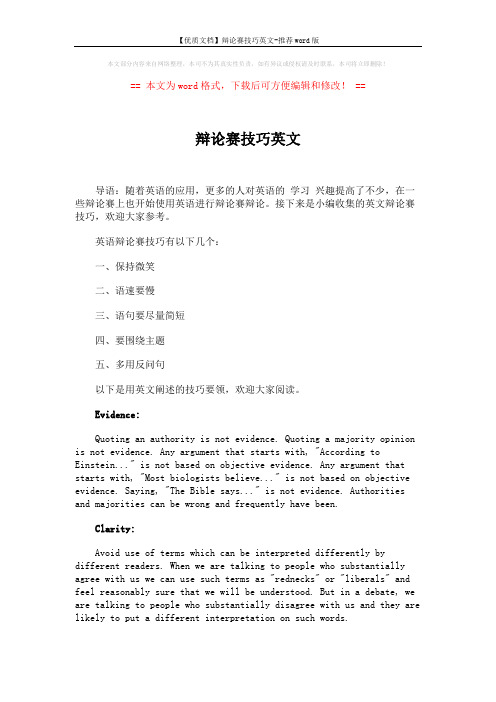
本文部分内容来自网络整理,本司不为其真实性负责,如有异议或侵权请及时联系,本司将立即删除!== 本文为word格式,下载后可方便编辑和修改! ==辩论赛技巧英文导语:随着英语的应用,更多的人对英语的学习兴趣提高了不少,在一些辩论赛上也开始使用英语进行辩论赛辩论。
接下来是小编收集的英文辩论赛技巧,欢迎大家参考。
英语辩论赛技巧有以下几个:一、保持微笑二、语速要慢三、语句要尽量简短四、要围绕主题五、多用反问句以下是用英文阐述的技巧要领,欢迎大家阅读。
Evidence:Quoting an authority is not evidence. Quoting a majority opinion is not evidence. Any argument that starts with, "According to Einstein..." is not based on objective evidence. Any argument that starts with, "Most biologists believe..." is not based on objective evidence. Saying, "The Bible says..." is not evidence. Authorities and majorities can be wrong and frequently have been.Clarity:Avoid use of terms which can be interpreted differently by different readers. When we are talking to people who substantially agree with us we can use such terms as "rednecks" or "liberals" and feel reasonably sure that we will be understood. But in a debate, we are talking to people who substantially disagree with us and they are likely to put a different interpretation on such words.Emotionalism:Avoid emotionally charged words--words that are likely to produce more heat than light. Certainly the racial, ethnic, or religious hate words have no place in rational debating. Likewise, avoid argumentum ad hominem. Personal attacks on your opponent are an admission of intellectual bankruptcy. Also, slurs directed at groups with whomyour opponent is identified are usually nonproductive. Try to keep attention centered on the objective problem itself. There is aspecial problem when debating social, psychological, political, or religious ideas because a person's theories about these matters presumably have some effect on his own life style. In other words, rather than saying "and that's why you are such an undisciplined wreck" say, "a person adopting your position is, I believe, likely to become an undisciplined wreck because ..."Causality:Avoid the blunder of asserting a causal relationship with the popular fallacy of post hoc ergo propter hoc which declares that because some event A happened and immediately afterward event B happened that event A was the cause of event B.(I knew someone whose car stalled on the way to work. She would get out and open the hood and slam it and then the car would start. Singing a song would have been just as effective to allow time for a vapor lock to dissipate!) Also avoid the popular fallacy that correlation proves causation. People who own Cadillacs, on average, have higher incomes than people who don't. This does not mean that if we provided people withCadillacs that they would have higher incomes.Innuendo:Innuendo is saying something pejorative about your opponent without coming right out and saying it but by making more or less veiled allusions to some circumstance, rumor, or popular belief. If you want to see some excellent examples of innuendo, watch Rush Limbaugh. Politicians are, unfortunately, frequently guilty of using innuendo. It is an easy way to capitalize on popular prejudices without having to make explicit statements which might be difficultor impossible to defend against rational attack.Be sure of your facts. What is the source of your information? If it is a newspaper or a magazine, are you sure that the information hasn't been "slanted" to agree with that publication's political bias? Where crucial facts are concerned, it is best to check with more than。
英语辩论经典题目_辩论的技巧有哪些

英语辩论经典题目_辩论的技巧有哪些英语辩论越来越在人群中兴起,那么英语辩论有哪些经典的题目呢?今天店铺给大家分享一些英语辩论题目,希望对大家有所帮助。
有趣的英语辩论题目19个1. Staying in China or going aboard for education becomes more and more popular for several years. Do you think which is better?2. “Piracy” means the publishing, reproducing of a book, CD, VCD, tape, etc. without permission. Are you in favor of piracy or against piracy?3. Should middle school students be allowed to bring the cell phone or not?4. Do you think cosmetic surgery have a positive or negative influence on our society?5. Should different cultures merge into each other or maintain their unique features?6. Can money buy happiness?7. Which is more important for hunting a job, the personal ability or interpersonal relationships?8. Which is more important, economic development or environmental protection?9. Foreign culture has great effect on Chinese culture. Does the advantage of such effect outweigh the disadvantage or does the disadvantage outweigh the advantage?10. What does work mean to people? Work to live or live to work?11. Does advertisement play a positive or negative role in our society?12. Are pets good or bad for mankind?13. Should we diet in order to keep fit?14. Should celebrities have greater protection from the media or not?15. Should the sale and consumption of alcohol be banned or not?16. Are beauty contests good or harmful to our society?17. Does criticism do more harm than good to people?18. Is it necessary to pass CET4 or CET6 in the university?19. Is puppy love good or bad for studying?英语辩论题目精选20个1. Is TV a malign influence on society?2. Talk about Poverty and Wisdom3. If u r on a deserted island what three things do u want to take?4. Talk about the meaning of Being Capable/Being Helpful/Kind5. What’s your understanding of team work?6. How to learn perfect English?7. We learn knowledge only from our teachers.8. We learn knowledge not only from our teachers.9. Do you prefer to buy sth. in big stores or small ones?10. Is career more important than family?11. Can people make true friends on the internet?12. Being single is very popular in China?13. Can you find out which qualities you look for in a boyfriend or girlfriend?14. What would you see as advantages for you to wait for your marriage, if you’ve found the perfect boyfriend or girlfriend?15. Do you prefer to marry before you have a successfulcareer or after you have a successful career?16. Positive side: It's good for people to grow up in adverse circumstances.Negative side: It's not good for people to grow up in adverse circumstances.17. Is there true love on the internet?18. Should professionals be paid according to their performance?19. Should Physical Education in schools be compulsory?20. Should parents have the right to educate their children privately?英语辩论的技巧一、保持微笑每次站起来的时候要先微笑,过两秒再进行辩论。
英语辩论形式及技巧
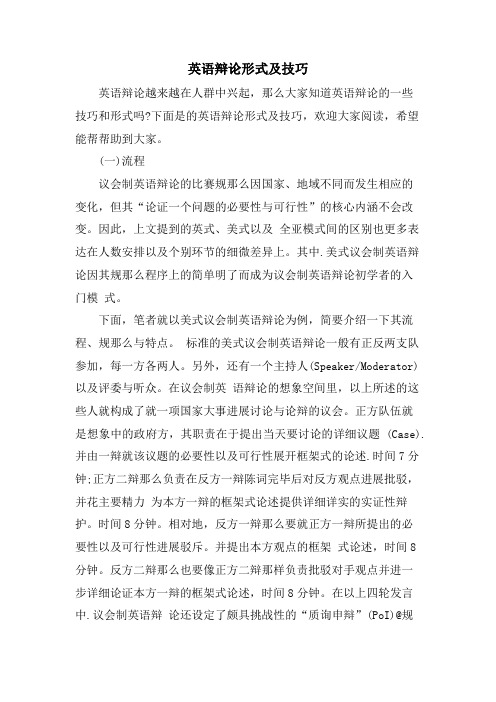
英语辩论形式及技巧英语辩论越来越在人群中兴起,那么大家知道英语辩论的一些技巧和形式吗?下面是的英语辩论形式及技巧,欢迎大家阅读,希望能帮帮助到大家。
(一)流程议会制英语辩论的比赛规那么因国家、地域不同而发生相应的变化,但其“论证一个问题的必要性与可行性”的核心内涵不会改变。
因此,上文提到的英式、美式以及全亚模式间的区别也更多表达在人数安排以及个别环节的细微差异上。
其中.美式议会制英语辩论因其规那么程序上的简单明了而成为议会制英语辩论初学者的入门模式。
下面,笔者就以美式议会制英语辩论为例,简要介绍一下其流程、规那么与特点。
标准的美式议会制英语辩论一般有正反两支队参加,每一方各两人。
另外,还有一个主持人(Speaker/Moderator)以及评委与听众。
在议会制英语辩论的想象空间里,以上所述的这些人就构成了就一项国家大事进展讨论与论辩的议会。
正方队伍就是想象中的政府方,其职责在于提出当天要讨论的详细议题 (Case).并由一辩就该议题的必要性以及可行性展开框架式的论述.时间7分钟;正方二辩那么负责在反方一辩陈词完毕后对反方观点进展批驳,并花主要精力为本方一辩的框架式论述提供详细详实的实证性辩护。
时间8分钟。
相对地,反方一辩那么要就正方一辩所提出的必要性以及可行性进展驳斥。
并提出本方观点的框架式论述,时间8分钟。
反方二辩那么也要像正方二辩那样负责批驳对手观点并进一步详细论证本方一辩的框架式论述,时间8分钟。
在以上四轮发言中.议会制英语辩论还设定了颇具挑战性的“质询申辩”(PoI)@规那么。
即.在每轮演讲的一分钟以后及最后一分种之前,相对方都可以针对发言者的陈述提出即时性的问题或申辩,时间限在15秒以内。
四轮发言完毕后,由反方(通常为一辩)开始4分钟的批驳性总结陈词.而正方(也通常为一辩)那么在其发言完毕后进展s分钟的总结陈述。
在这两个总结期间.不允许对方提任何POI。
(二)规那么第一.比赛将由一名计时员严格把握时间.制止双方超时陈述.计时员在每段陈述开始一分钟后以及最后一分钟前.都会给辩手相应的提示。
英语辩论的一些技巧
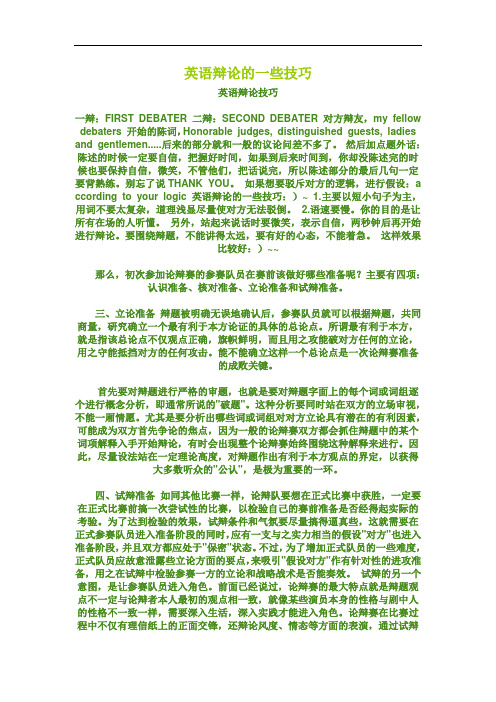
英语辩论的一些技巧英语辩论技巧一辩:FIRST DEBATER 二辩:SECOND DEBATER 对方辩友,my fellow debaters 开始的陈词,Honorable judges, distinguished guests, ladies and gentlemen.....后来的部分就和一般的议论问差不多了。
然后加点题外话:陈述的时候一定要自信,把握好时间,如果到后来时间到,你却没陈述完的时候也要保持自信,微笑,不管他们,把话说完,所以陈述部分的最后几句一定要背熟练。
别忘了说THANK YOU。
如果想要驳斥对方的逻辑,进行假设:a ccording to your logic 英语辩论的一些技巧:)~ 1.主要以短小句子为主,用词不要太复杂,道理浅显尽量使对方无法驳倒。
2.语速要慢。
你的目的是让所有在场的人听懂。
另外,站起来说话时要微笑,表示自信,两秒钟后再开始进行辩论。
要围绕辩题,不能讲得太远,要有好的心态,不能着急。
这样效果比较好:)~~那么,初次参加论辩赛的参赛队员在赛前该做好哪些准备呢?主要有四项:认识准备、核对准备、立论准备和试辩准备。
三、立论准备辩题被明确无误地确认后,参赛队员就可以根据辩题,共同商量,研究确立一个最有利于本方论证的具体的总论点。
所谓最有利于本方,就是指该总论点不仅观点正确,旗帜鲜明,而且用之攻能破对方任何的立论,用之守能抵挡对方的任何攻击。
能不能确立这样一个总论点是一次论辩赛准备的成败关键。
首先要对辩题进行严格的审题,也就是要对辩题字面上的每个词或词组逐个进行概念分析,即通常所说的"破题"。
这种分析要同时站在双方的立场审视,不能一厢情愿。
尤其是要分析出哪些词或词组对对方立论具有潜在的有利因素,可能成为双方首先争论的焦点,因为一般的论辩赛双方都会抓住辩题中的某个词项解释入手开始辩论,有时会出现整个论辩赛始终围绕这种解释来进行。
因此,尽量设法站在一定理论高度,对辩题作出有利于本方观点的界定,以获得大多数听众的"公认",是极为重要的一环。
大学生英语辩论赛技巧
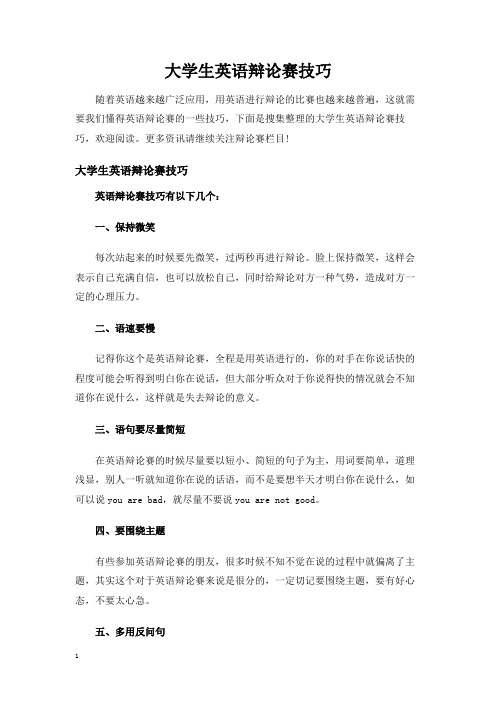
大学生英语辩论赛技巧随着英语越来越广泛应用,用英语进行辩论的比赛也越来越普遍,这就需要我们懂得英语辩论赛的一些技巧,下面是搜集整理的大学生英语辩论赛技巧,欢迎阅读。
更多资讯请继续关注辩论赛栏目!大学生英语辩论赛技巧英语辩论赛技巧有以下几个:一、保持微笑每次站起来的时候要先微笑,过两秒再进行辩论。
脸上保持微笑,这样会表示自己充满自信,也可以放松自己,同时给辩论对方一种气势,造成对方一定的心理压力。
二、语速要慢记得你这个是英语辩论赛,全程是用英语进行的,你的对手在你说话快的程度可能会听得到明白你在说话,但大部分听众对于你说得快的情况就会不知道你在说什么,这样就是失去辩论的意义。
三、语句要尽量简短在英语辩论赛的时候尽量要以短小、简短的句子为主,用词要简单,道理浅显,别人一听就知道你在说的话语,而不是要想半天才明白你在说什么,如可以说you are bad,就尽量不要说you are not good。
四、要围绕主题有些参加英语辩论赛的朋友,很多时候不知不觉在说的过程中就偏离了主题,其实这个对于英语辩论赛来说是很分的,一定切记要围绕主题,要有好心态,不要太心急。
五、多用反问句在进行比赛的时候,可以多用一些反问句来增加气势,让对方觉得你准备充足,如经常用到Don't you think that。
大家一定要记得上面所说的几点,并且多点练习就好。
大学生英语辩论赛常用语A引入自己的新观点或看法的用语Another point is that … 另一点是……Another way of looking at it is ... 看这个问题的另一个看法是 (I)forgot to say / tell you that… 我忘记要讲…...B征求他人观点或意见的用语I would be glad to hear your opinion of … 我很乐意听听你对……的意见。
Are you of the same opinion as I? 你与我的看法一致吗?I was wondering where you stood on the question of … 我想知道你对……问题怎么看。
英语辩论赛万能句子反驳
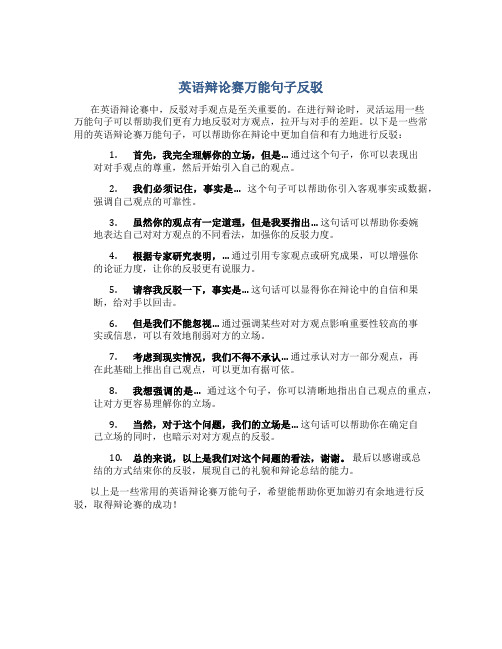
英语辩论赛万能句子反驳
在英语辩论赛中,反驳对手观点是至关重要的。
在进行辩论时,灵活运用一些
万能句子可以帮助我们更有力地反驳对方观点,拉开与对手的差距。
以下是一些常用的英语辩论赛万能句子,可以帮助你在辩论中更加自信和有力地进行反驳:
1.首先,我完全理解你的立场,但是…通过这个句子,你可以表现出
对对手观点的尊重,然后开始引入自己的观点。
2.我们必须记住,事实是…这个句子可以帮助你引入客观事实或数据,
强调自己观点的可靠性。
3.虽然你的观点有一定道理,但是我要指出…这句话可以帮助你委婉
地表达自己对对方观点的不同看法,加强你的反驳力度。
4.根据专家研究表明,…通过引用专家观点或研究成果,可以增强你
的论证力度,让你的反驳更有说服力。
5.请容我反驳一下,事实是…这句话可以显得你在辩论中的自信和果
断,给对手以回击。
6.但是我们不能忽视…通过强调某些对对方观点影响重要性较高的事
实或信息,可以有效地削弱对方的立场。
7.考虑到现实情况,我们不得不承认…通过承认对方一部分观点,再
在此基础上推出自己观点,可以更加有据可依。
8.我想强调的是…通过这个句子,你可以清晰地指出自己观点的重点,
让对方更容易理解你的立场。
9.当然,对于这个问题,我们的立场是…这句话可以帮助你在确定自
己立场的同时,也暗示对对方观点的反驳。
10.总的来说,以上是我们对这个问题的看法,谢谢。
最后以感谢或总
结的方式结束你的反驳,展现自己的礼貌和辩论总结的能力。
以上是一些常用的英语辩论赛万能句子,希望能帮助你更加游刃有余地进行反驳,取得辩论赛的成功!。
- 1、下载文档前请自行甄别文档内容的完整性,平台不提供额外的编辑、内容补充、找答案等附加服务。
- 2、"仅部分预览"的文档,不可在线预览部分如存在完整性等问题,可反馈申请退款(可完整预览的文档不适用该条件!)。
- 3、如文档侵犯您的权益,请联系客服反馈,我们会尽快为您处理(人工客服工作时间:9:00-18:30)。
清华大学辩论团队培训资料吴子薇澳门大学美女辩论词郭文娜,北京外国语大学外研社激情辩论外研社辩论赛达人视频陈懿北京理工大学外研社辩论赛达人视频,胡杨,浙江大学英语辩论赛技巧(外研社辩论赛思辨和语言训练On DebatingClarity: Avoid use of terms which can be interpreted differently by different readers. When we are talking to people who substantially agree with us we can use such terms as "rednecks" or "liberals" and feel reasonably sure that we will be understood. But in a debate, we are talking to people who substantially disagree with us and they are likely to put a different interpretation on such words.Evidence: Quoting an authority is not evidence. Quoting a majority opinion is not evidence. Any argument that starts with, "According to Einstein..." is not based on objective evidence. Any argument that starts with, "Most biologists believe..." is not based on objective evidence. Saying, "The Bible says..." is not evidence. Authorities and majorities can be wrong and frequently have been. (历届辩论赛中出现最多的问题)Emotionalism: Avoid emotionally charged words--words that are likely to produce more heat than light. Certainly the racial, ethnic, or religious hate words have no place in rational debating. Likewise, avoid argumentum ad hominem. Personal attacks on your opponent are an admission of intellectual bankruptcy. Also, slurs directed at groups with whom your opponent is identified are usually nonproductive. Try to keep attention centered on the objective problem itself. There is a specialproblem when debating social, psychological, political, or religious ideas because a person's theories about these matters presumably have some effect on his own life style. In other words, rather than saying"and that's why you are such an undisciplined wreck" say,"a person adopting your position is, I believe, likely to become an undisciplined wreck because ..."Causality: Avoid the blunder of asserting a causal relationship with the popular fallacy of post hoc ergo propter hoc which declares that because some event A happened and immediately afterward event B happened that event A was the cause of event B. (I knew someone whose car stalled on the way to work. She would get out and open the hood and slam it and then the car would start. Singing a song would have been just as effective to allow time for a vapor lock to dissipate!) Also avoid the popular fallacy that correlation proves causation. People who own Cadillacs, on average, have higher incomes than people who don't. This does not mean that if we provided people with Cadillacs that they would have higher incomes.Innuendo(影射): Innuendo is saying something pejorative about your opponent without coming right out and saying it but by making more or less veiled allusions to some circumstance, rumor, or popular belief. If you want to see some excellent examples of innuendo, watch Rush Limbaugh. Politicians are, unfortunately, frequently guilty of using innuendo. It is an easy way to capitalize on popular prejudices without having to make explicit statements which might be difficult or impossible to defend against rational attack.Be sure of your facts. What is the source of your information? If it is a newspaper or a magazine, are you sure that the information hasn't been "slanted" to agree with that publication's political bias? Where crucial facts are concerned, it is best to check with more than one source. Often international publications will give you a different perspective than your hometown newspaper. Check to see whether the book you are using was published by a regular publishing company or whetherit was published by some special interest group like the John Birch Society or a religious organization. These books cannot be trusted to present unbiased evidence since their motivation for publishing is not truth but rather the furtherance of some political or religious view.Understand your opponents' arguments. It is good practice to argue with a friend and take a position with which you do not agree. In this way you may discover some of the assumptions your opponents are making which will help you in the debate. Remember that everybody thinks that his position is the right one, and everybody has his reasons for thinking so.Do not impute ridiculous or malevolent ideas to your opponent.An example of this is the rhetorical statement,"Have you stopped beating your wife?" This imputes or presupposes that your opponent has beaten his wife. One frequently sees references by conservative speakers and writers to the idea that gay activists want "special privileges." This would be ridiculous if it were true. It isn't true, but speaking as if it were true and well known to all is egregiously unfair to listeners or readers who may not be well informed. It is probably always wise to treat your opponent with respect, even if he doesn't deserve it. If he doesn't deserve respect, this will probably soon become obvious enough.Regression to the mean(逻辑退化): Another source of error which occurs very frequently is the failure to take into account regression to the mean. This is a bit technical, but it is very important, especially in any kind of social or psychological research which depends upon statistical surveys or even experiments which involve statistical sampling. Rather than a general statement of the principle (which becomes more and more unintelligible as the statement becomes more and more rigorous) an example will be used.Let's consider intelligence testing.1. Perhaps we have a drug that is supposed to raise the IQ of mentally retarded kids. So we give a thousand intelligence tests and select the 30 lowest scoring individuals.2. We then give these low scoring kids our drug and test them again.3. We find that there has been an increase in the average of their IQ scores.4. Is this evidence that the drug increased the IQ?Not necessarily! Suppose we want to show that smoking marijuana lowers the IQ. Well, we take the 30 highest scoring kids in our sample and give them THC and test them again. We find a lower average IQ.Is this evidence that marijuana lowers the IQ?Not necessarily! Any statistician knows that if you make some kind of a measurement of some attribute of a large sample of people and then select the highest and lowest scoring individuals and make the same measurement again, the high scoring group will have a lower average score and the low scoring group will have a higher average score than they did the first time. This is called "regression to the mean" and it is a perfectly universal statistical principle.There are undoubtedly more points to be made here. Suggestions will be gratefully received. Larry has made the following suggestions:•Apply the scientific method. (运用科学方法)•Cite relevant personal experience. (合理引用相关的个人经历)•Be polite. (辩论过程中有礼待人)•Organize your response. (Beginning, middle, end.) (对你辩词进行合理的组织)•Treat people as individuals.•Cite sources for statistics and studies used.•Literacy works. Break posts into sentences and paragraphs.•Read the post you are responding to.•Stay open to learning.。
